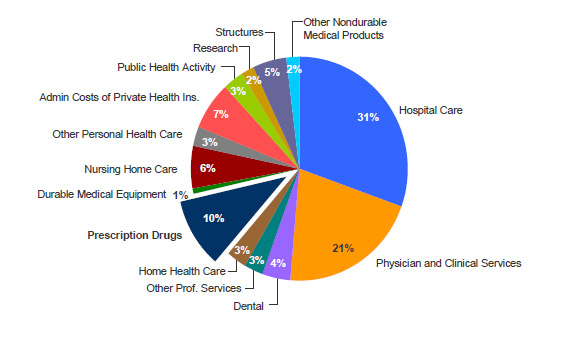The rhetorical question “doctors or pharma” asked by the podcast host was to show the enormous value brought by big pharma despite their tiny share of healthcare spending (13%). To this rhetorical question, I’d answer “pharma” without hesitating. I don’t even see how this can be debatable. With the best doctors in the world, but without drugs, we would have a way lower life expectancy. (And anecdotally, many people here seem to do well with good drugs while bypassing doctors.)
Then, are doctors even good at generating a differential diagnosis? Medical errors are the third cause of death in the US and AI already makes better diagnoses than doctors.
Indeed, when we look at various countries, above about one doctor per 1k inhabitants, there’s no association with life expectancy:
Data from the World Bank, I took the 2019 life expectancy before the Covid dip (but I assume the results would be identical): GDP vs Life expectancy vs Doctors - Google Sheets
Turkey is a good example indeed: 2 physicians per 1k people vs 3.6 in the US and 4.3 in the EU. Nominal GDP per capita $11k vs $37k in the EU and $76 in the US. And yet life expectancy: Turkey 76y, EU 80y and US 76y. But Turkey has access to the same pharmaceutical miracles brought to us by big pharma.
My (soon-to-be) in-laws are Turkish doctors and hospital owners, and my fiancée has a medical tourism business bringing European and American patients to Turkey. I’ve been treated in Turkey myself, and I can confirm that the healthcare system there is 10x better than in France (where I was born and lived most of my life) and the UK (where I’ve been living for the past 3y). I attended meetings in London with my father-in-law (a radiologist, who wanted to open a branch in the UK) and British NHQ doctors, and the Brits were shocked by:
- The quality of the equipment in Turkey (latest device, world-class in Turkey vs some old machines in the UK, at least in NHS clinics),
- What is offered to people, for instance at most 2 ultrasounds for pregnant women in the UK (NHS) vs every month in Turkey (in the public healthcare system),
- The supply: you get an appointment in a few days in Turkey (if not on the same day) vs after months with the NHS.
(btw, if you want cosmetic or longevity treatments or checkups in Turkey, lmk)
I was also impressed by the Turkish healthcare IT:
- Every single medical act (whether it’s done in the public or private sector) is registered in a central database and all Turkish people have access to a national healthcare portal (e-Nabız) where they can see prescriptions, test results (I think you can plot them over time), MRI images, etc.
- When a doctor prescribes you something, it’s a digital prescription attached to your ID card, so you can go to any pharmacy in Turkey, show your ID card and the pharmacist gets the prescription from the system and gives you the prescribed drugs (for “free,” ofc).
Westerners don’t realize how bad their healthcare system is until they go to “developing” countries. These countries have less money and fewer doctors but achieve better results (as measured by life expectancy) because they leverage tech and drugs.
Anyway, here’s the breakdown of healthcare spending in the US (source):

It seems to be around 15% around the world and fairly constant (source):
What about profits? Here are the Return on Capital (ROIC):
- Healthcare Support Services: 45.74%
- Hospitals/Healthcare Facilities: 20.16%
- Healthcare Information and Technology: 14.28%
- Drugs (Pharmaceutical): 13.38%
- Healthcare Products (I guess it means medical devices and other non-drug medical products?): 13.08%
- Drugs (Biotechnology): 1.56%
- (US average across industries, without financials: 14.70%)
So big pharma’s profits are lower than average and they represent a small part of total healthcare expenditure, while medical staff (doctors, pharmacists, nurses, etc.) represent the majority of the spending and are swimming in cash with higher than average profits.
But big pharma is bad because they lobby? Think again. In the US, according to Open Secrets, total spent in annual lobbying:
- Pharmaceuticals/Health Products (Pfizer, Amgen, etc.): $378,585,382
- Hospitals/Nursing Homes (American Hospital Association, HCA Healthcare, etc.): $131,012,728
- Health Services & Health maintenance organizations (UnitedHealth Group, Kaiser Permanente, etc.): $126,810,968
- Health Professionals (American Medical Association, American Academy of Family Physicians, etc.): $93,471,087
So “Pharmaceuticals/Health Products” represent 51% ($378,585,382/$739,055,454) of all health lobbying spending in the US. Same as nurses and doctors (as the main cost of “health services” is the medical staff). And actually, if you look at “Pharmaceuticals/Health Products” they put in this category the “Pharmaceutical Care Management Association” representing the corrupt PBMs (so not big pharma) and generic manufacturers like Teva. They also included device manufacturers like Abbott Laboratories and Medtronic Inc.
Conclusion: doctors represent a larger share of healthcare spending than pharma, they make more money than pharma, they spend more on lobbying than pharma, they’re not associated with an increased lifespan, and they can be replaced by AI.
Quod erat demonstrandum.